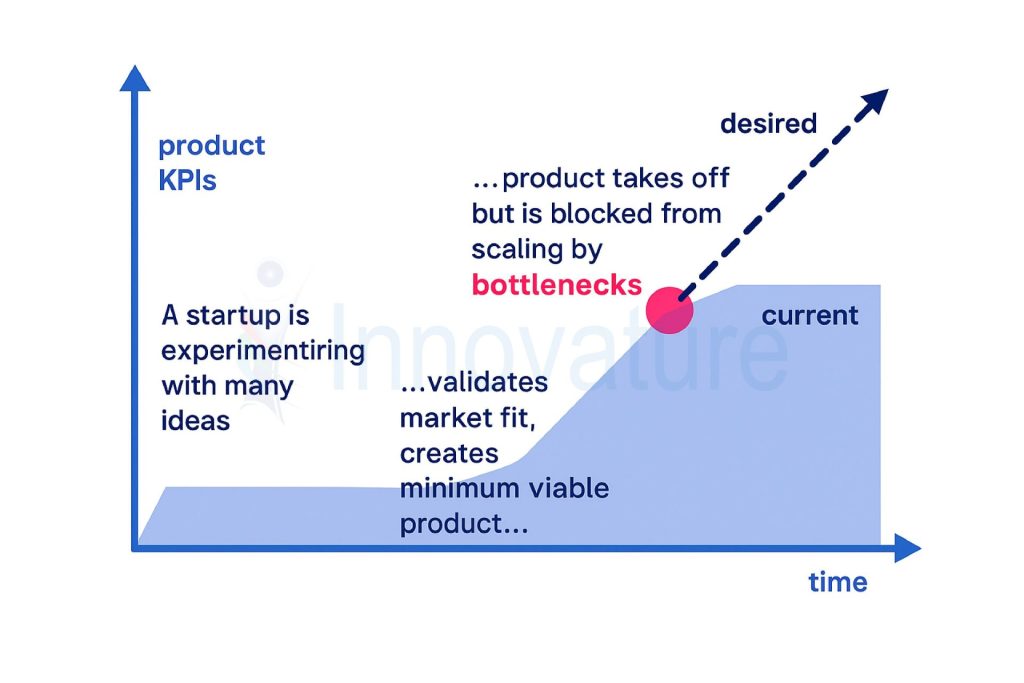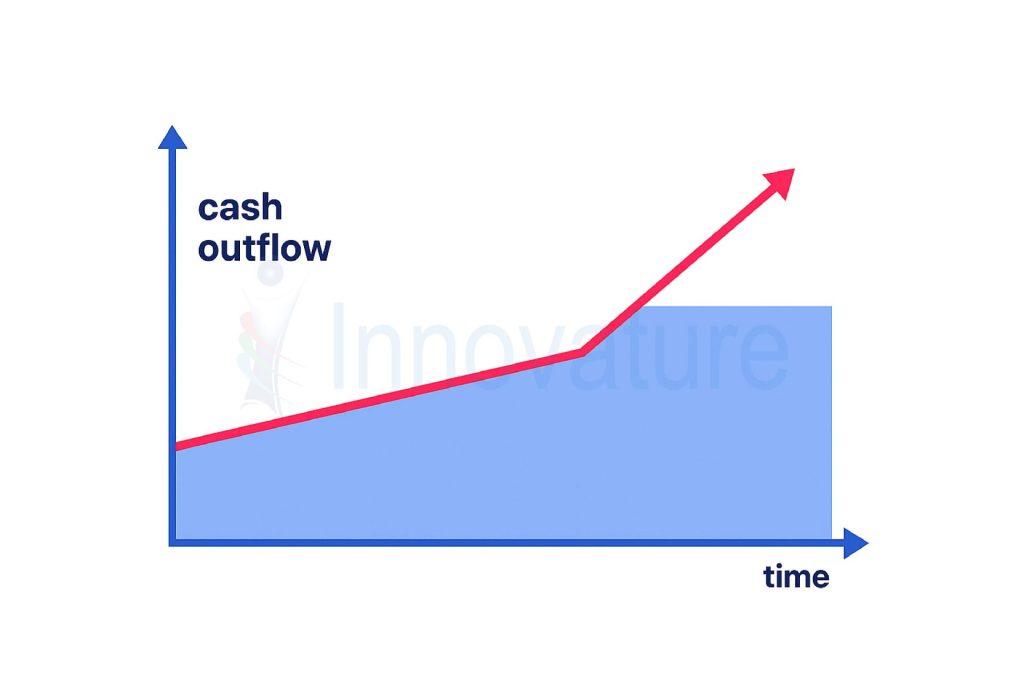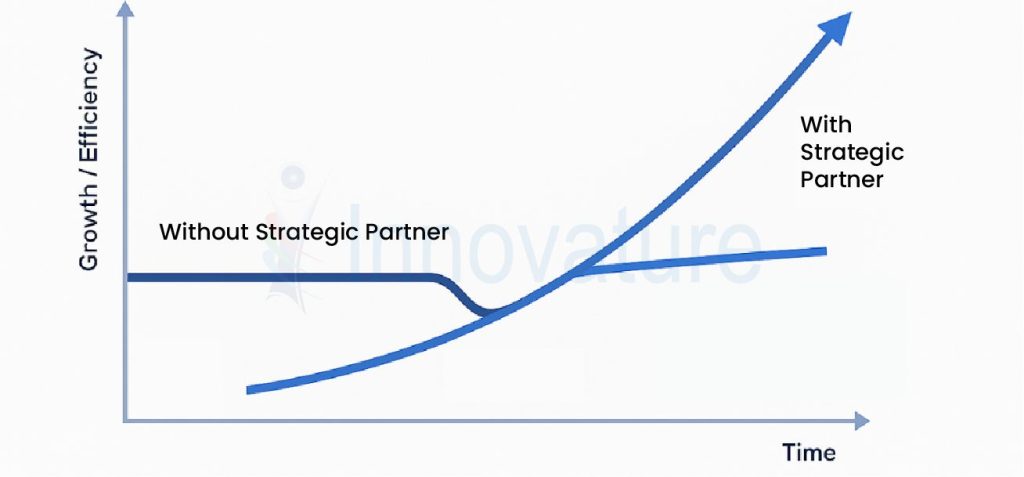
“Founder Bottleneck” sounds fancy, right? Even the founders reading this might be like—this is yet another article on why founders should prioritize finding the right partner before scaling. Well, you thought right. But if you are a founder with the right mindset to grow, you know the truth: partners are essential for growth.
People bootstrap fancy products and either over-market them or put too much hope in their MVP—and fall like a house of cards when things go overboard. A wise founder once said, “Anticipate bottlenecks before you accelerate.” That should always be the USP.
Scaling sounds good, right? The more people know about your product or services, the more revenue and growth. But that’s just the surface. Especially if you’re in a startup, scaling without partners means more work for fewer people, tighter deadlines, and eventual burnout.
The Problem
As of 2023, 50,000 startups have emerged in India alone, and the ecosystem is growing at a healthy rate of 12–13% annually. But here’s the catch—90% of these startups fail within the first five years. The reasons? At the core, it’s almost always monetization and scaling.
Now, let’s talk about scaling. Everyone wants to scale fast—more users, more visibility, more revenue. But scaling isn’t just a growth lever—it’s a stress test. And that’s where the founder bottleneck kicks in. Startups often revolve around the founder: they lead product, approve every decision, handle clients, fix bugs at 2 a.m., and drive the pitch. While this works in the early stage, it creates a dangerous centralization of control. As the company grows, the founder becomes the bottleneck—nothing moves without them, everything depends on their time, energy, and decision-making.
Teams wait for approvals, opportunities get delayed, and execution slows down. You’re no longer building fast—you’re stuck in a loop of reactive chaos.
Add to that the pressure of limited resources, high expectations, and an ever-moving market, and the system begins to crack. Burnout becomes inevitable—not just for the founder, but for the team as well.
And without the right partners—whether it’s in tech, marketing, operations, or product—scaling feels less like a milestone and more like a meltdown.
Inefficient Time Management
You might be running finance, you might be the go-to person handling marketing, or you might be trying to position your product in one demographic while chasing success in another. But at the end of the line, all of these will eventually hit back at your startup.
Let’s say you haven’t scaled yet, and your strategic tech partner is your co-founder buddy who’s coding across multiple languages and frameworks. You shouldn’t be surprised if things start falling apart—delayed project timelines, reduced customer satisfaction, and missed opportunities are just a few of the downstream effects of inefficient time management.
And the biggest tipping point? Stunted growth.
Because if your team, no matter how skilled, is strapped for time and lacks the resources to handle large-scale projects, you risk getting outpaced by your competitors. Especially the ones already partnering strategically to stay ahead of the game.
Founders are the Problem, Sometimes!
It might be hard to take in, but the truth is—the worst bottleneck for any startup can sometimes be the founder(s) themselves. This idea aligns closely with the Peter Principle, a management theory which states that individuals tend to be promoted to their level of incompetence. In the context of startups, founders often start as experts in one area—be it product development, marketing, or finance—but as their company grows, they are forced to take on broader and more complex roles they might not be fully prepared for.
Wearing multiple hats is the norm for founders, especially in early-stage startups, but this can quickly become a double-edged sword. As demands increase, founders can become overwhelmed, stretched too thin, and struggle to delegate effectively. Instead of focusing on strategic growth, they get bogged down in operational details or tasks outside their expertise.
Lack of delegation and over-centralization result in decision-making hurdles that slow down both growth and revenue. This means that the founder’s limited bandwidth to delegate tasks becomes the biggest obstacle to the startup’s growth. Failing to recognize this can leave startups vulnerable to being outpaced by competitors who have already invested in partnerships and scalable processes early in their lifecycle.
 Concept Credits: martinfowler.com
Concept Credits: martinfowler.com
When Should You Consider Bringing in a Strategic Partner
Potential Markets, but no Local Experience
Imagine your startup is based in the MENA region, and you’re planning to expand into the Far East—specifically Japan. While the ambition is commendable, the execution might falter if you’re unfamiliar with the unique preferences and behaviors of the Japanese market.
That’s where a strategic partner like Innovature can make all the difference. By partnering with a company that understands the nuances of the Japanese audience and has worked with an international clientele, your startup can scale effectively, drive cross-functional revenue, and expand with confidence.
You lack in-house capabilities for specialized tasks
Not all startups have the scale or internal bandwidth to manage everything in-house, especially when it comes to localization, complex technical integrations, or establishing relationships in unfamiliar markets. Instead of building these capabilities from scratch and stretching your team thin, it’s often more effective to bring in a strategic partner who already has the experience, infrastructure, and network in place.
You need to move faster than your current pace
Speed-to-market can be the difference between gaining a first-mover advantage and missing the opportunity entirely. A seasoned partner already has the tools, frameworks, and relationships in place to help you accelerate timelines without sacrificing quality.
When the cash burn is high, but the revenue growth is flat
From localization, compliance, and integrations, all of these cost you money. For a lean team, trying to tackle them alone can lead to delays, errors, and even missed market opportunities. A seasoned partner brings deep domain expertise, proven frameworks, and market-ready solutions—cutting down your time-to-market and helping you move the needle on revenue without further straining your cash reserves.

The above graph is a typical example of startups burning through cash through time, when they are trying to scale and when not considered a strategic partner for scaling.
How can Innovature Help You Scale Smarter
By now, you’ve likely experienced the common bottlenecks that follow the MVP phase—tight timelines, high burn rates, and gaps in in-house expertise. That’s where the right strategic partner becomes more than just support—it becomes a growth catalyst.
At Innovature, we don’t just deliver services—we co-build your vision. Here’s how we help founders move beyond early-stage hurdles and unlock sustained growth:
- From MVP to full-scale: Our agile development pods integrate quickly and deliver faster, helping you maintain momentum.
- AI that scales with you: We help you insource AI to smooth out scaling challenges without disrupting your current workflows.
- New markets, optimized growth: Whether expanding into new geographies or scaling an existing product, we guide you through each phase—from launch and early traction to maturity—ensuring your product evolves with your goals.
- Future-proof technology: From accessibility audits to performance optimization, we keep your tech stack resilient and ready.
- Scale smart, not fast: Avoid premature hiring. Our flexible staffing and DevOps-as-a-Service model ensures you scale your team only when needed.
From Scaling to Soaring
Scaling isn’t just about growth—it’s about sustainable, strategic progress. When you team up with a partner like Innovature, you’re not just accelerating; you’re setting yourself up for success.
At the end of the day, it all comes down to this – do you prioritize long-term growth, if so strategic partners are your go to way.

You retain full control of your IP, while we bring in the engineering expertise, and scalable systems that help you go further—faster. From solving complex tech bottlenecks to accelerating your go-to-market strategy, our startup consultants don’t just bridge gaps—we drive transformation.
We’ve helped startups move from MVP to momentum, eliminating bottlenecks and enabling real, scalable growth.









